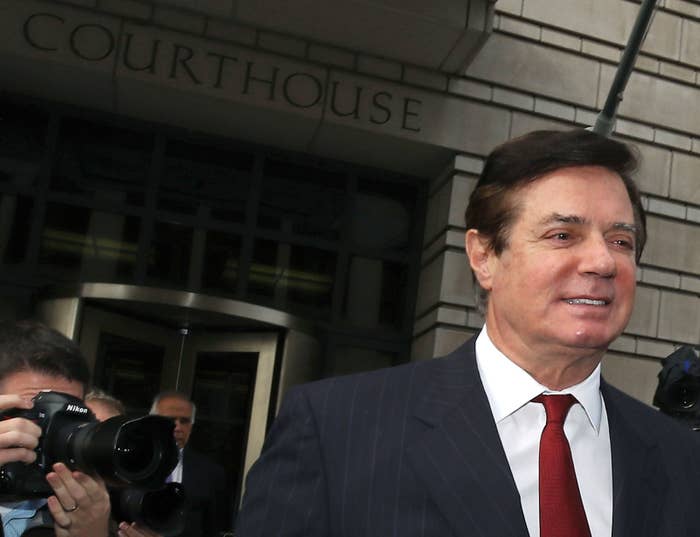
WASHINGTON — Special counsel Robert Mueller’s office once again punted when offered the chance to recommend a specific prison sentence for former Trump campaign chair Paul Manafort. But it pulled no punches in a sentencing memo made public Saturday, calling Manafort a “bold” offender likely to commit more crimes after serving his time.
Manafort is scheduled for sentencing in his criminal case in Washington, DC — one of two prosecutions brought against him by special counsel Robert Mueller’s office — on March 13. Although prosecutors didn’t specify what exact sentence they thought Manafort should get, they urged the judge to impose a stiff penalty, arguing he presented a “grave risk” of reoffending once he’s released back into the community.
“His deceit, which is a fundamental component of the crimes of conviction and relevant conduct, extended to tax preparers, bookkeepers, banks, the Treasury Department, the Department of Justice National Security Division, the FBI, the special counsel’s office, the grand jury, his own legal counsel, Members of Congress, and members of the executive branch of the United States government. In sum, upon release from jail, Manafort presents a grave risk of recidivism,” Mueller’s office wrote.
Prosecutors noted that the estimated sentencing guidelines range for Manafort in his DC case is between 210 and 262 months in prison — 17.5 to nearly 22 years — but by law, he can be sentenced at most to 10 years in prison for the two counts he pleaded guilty to in the fall. Each count carries a maximum penalty of five years, notwithstanding aggravating factors that boosted the sentencing guidelines range, such as the amount of money involved and the sophistication of the financial crimes scheme.
Manafort is separately facing up to 24 years in prison in his criminal case in federal court in Virginia, according to a sentencing memo that the special counsel’s office filed on Feb. 15. He’ll be sentenced first in Virginia — the hearing before US District Judge T.S. Ellis III is scheduled for March 8.
The judge handling Manafort’s case in Washington, US District Judge Amy Berman Jackson, could stack her sentence on top of whatever Manafort gets in Virginia, or she could run it concurrently, which means he wouldn’t serve additional time. Prosecutors said in the latest sentencing memo that they would not take a position now on whether Manafort’s sentences should run all at once or back to back.
However, prosecutors wrote in a footnote that the US Sentencing Guidelines instruct courts to craft sentences involving multiple counts to reach the “total punishment” called for under the guidelines. They said that this analysis should apply to Jackson’s decision about whether to run Manafort’s sentence on top of his Virginia sentence — that is, to consider the much higher, 210- to 262-month guidelines range that Manafort faces in his DC case, notwithstanding the 10-year maximum for the two counts he pleaded guilty to.
In September 2018, on the eve of trial, Manafort pleaded guilty in his DC case to two counts: conspiracy to defraud the United States through a variety of financial crimes and other illegal activity, and conspiracy to interfere with potential witnesses in his case.
Prosecutors argued that there were no factors in Manafort’s background that “mitigates his criminality,” echoing a similar argument they made in the sentencing memo they filed in his Virginia case. Manafort displayed “boldness” in failing to report his lobbying work in the United States on behalf of the Ukrainian government, prosecutors wrote, even though he’d been warned before by the Justice Department about complying with the Foreign Agents Registration Act. Manafort earned millions of dollars for his work for Ukraine, and pleaded guilty to conspiring not to report that income or its overseas source to the US government; he was convicted by a jury of tax and reporting crimes in his Virginia case as well.
“For over a decade, Manafort repeatedly and brazenly violated the law. His crimes continued up through the time he was first indicted in October 2017 and remarkably went unabated even after indictment,” prosecutors wrote. “The sentence in this case must take into account the gravity of his conduct, and serve both to specifically deter Manafort and generally deter those who would commit a similar series of crimes.”
Manafort’s lawyers had been due to file their own sentencing memo in the DC case Friday, but they asked for an extension, citing the challenges of visiting Manafort in jail during a snowstorm last week. Manafort has been in custody since June, when Jackson ordered him detained pending trial after prosecutors first raised allegations that he’d tried to interfere with witnesses. His sentencing memo is now due Feb. 25; his sentencing memo in the Virginia case is due March 1.
Manafort agreed to cooperate with the government as part of his plea deal, but any benefit he might have gotten from working with prosecutors disappeared after Mueller’s office concluded he’d lied not only to them, but also to the FBI and the grand jury.
On Feb. 13, Jackson entered an order finding that prosecutors made the determination in “good faith” that Manafort breached his plea deal, absolving them of any obligations under the agreement. The judge wrote that Mueller’s office “established by a preponderance of the evidence” that Manafort made false statements about his communications with longtime associate Konstantin Kilimnik, a separate, as-yet-nonpublic Justice Department investigation, and a payment related to a debt that Manafort owed a law firm.
Prosecutors wrote in the DC sentencing memo that Manafort’s false statements after he pleaded guilty reflected “a hardened adherence to committing crimes and lack of remorse.”

